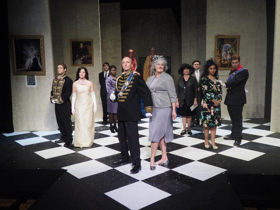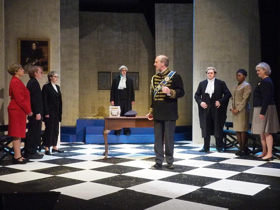Review: 'KING CHARLES III' Probes Royal Power at the Ivory

What is the place of monarchy in today's world? Kings are far from extinct. In the orient, Africa and the Middle East there are many good-old-fashioned autocrats still ruling their countries. But in the West we have only "constitutional monarchies". In 1215, with the Magna Carta, rebel barons wrested certain rights and liberties from King John of England. The rest of Europe gradually followed. Now Western monarchs serve as figureheads, symbols of national character, emblems of stability, focuses of nostalgia, role models (decreasingly), ribbon cutters, rubber stamps for their parliaments--and tourist attractions as well as grist for the tabloid mills--but they do not rule.
Mike Bartlett has written an utterly fascinating play, King Charles III. St. Louis Shakespeare is now offering an excellent production at the Ivory Theater.
The play deals with the very near future when the universally beloved Queen Elizabeth II dies and her son Charles ascends to the throne--an elevation for which he has waited for decades.
Parliament has approved a bi-partisan bill to place some restrictions on the press, which has gotten totally out of control. (Don't we all want to do that?) The Prime Minister brings the bill to Buckingham Palace to obtain the King's pro forma signature. But Charles feels that the bill goes too far--that it poses a danger to the people's freedom of speech. He refuses to sign until Parliament reconsiders certain points in it. This results in a constitutional crisis, a resurgence of anti-monarchist sentiment, riots in the streets and armed guards and a tank on the lawn of Buckingham Palace.
Family and Parliament strive to persuade Charles to sign, but he has been raised from birth to do what is right for the kingdom; his conscience simply will not let him sign.
Mike Bartlett gives us wonderfully believable characters; the personalities of the royal family ring so true. Charles, Camilla, William and Kate, Harry--they all transcend the cartoons we've seen in the media yet retain their familiar outlines. Harry's girl friend is the spirited Jessie. (The play premiered in 2014, before Meghan came on the scene.) Through Jessie he sees a doorway out of his stifling role as a royal.
All of this is done in a graceful blan k verse--with the occasional rhymed couplet. This device never intrudes, and in the more serious moments--as in Charles' gorgeous speech to Parliament--it adds immense gravitas.
k verse--with the occasional rhymed couplet. This device never intrudes, and in the more serious moments--as in Charles' gorgeous speech to Parliament--it adds immense gravitas.
From time to time the ghost of Princess Diana appears--to promise Charles (and then William) that he will be "England's greatest king". This figure is an inspired element in the play. Around it cluster shimmering evocations of both Macbeth and Hamlet.
It is a fine, gripping play. It really takes no side in the long-simmering political rumblings in England, but it does include some surprisingly persuasive arguments in favor of the monarchy. Everyone except those far-lefties who dream of dancing on the rubble of Buckingham Palace will pause for thought.
This is a very solid production. Everyone in the cast does excellent work:
King Charles......................... Colin Nichols
Camilla.................................. Donna Postel
Prince William...................... Michael Bouchard
Kate........................................ Lexie Baker
Prince Harry.......................... Jeremy Goldmeyer
Jessica................................... Britteny Henry
Press Adviser........................ Dustin Allison
Prime Minister...................... Andra Harkins
Leader of the Opposition... Patience Davis
Ghost..................................... Hannah Pauluhn
Supporting roles.................. Michael B. Perkins, William Pendergast, Jeff Lovell
There are spot-on accents throughout, from the royals right down to the kabob vendor.
Colin Nichols has long been a familiar face on St. Louis Stages. I've watched his work for twenty-five years. (I have myself directed him in six productions.) An Englishman, he's played kings and clerics, Macbeth--as well as the Drunken Porter--and even Albert Einstein. He's always an engaging presence on stage. Here, as King Charles, I think he gives his finest performance--restrained, committed, articulate, strong. And he looks and sounds so very much the part. This is a smart man in a smart performance. (Nichols is, in his secret daytime identity, a professor of cell biology and a Fellow of the Royal Society--along with Isaac Newton.)
Technical aspects of the production (set by S.H. Boygen, lights by Jaime Zayas, costumes by Michele Friedman Siler) are modest but more than adequate considering the constraints of the Ivory Theater. Special praise must go to sound designer Robin Weatherall.
If you like to think political thoughts this is a play you should not miss. St. Louis Shakespeare's production of King Charles III. It plays at the Ivory Theater through August 26.
(Photos by Ron James)
Reader Reviews

Videos
